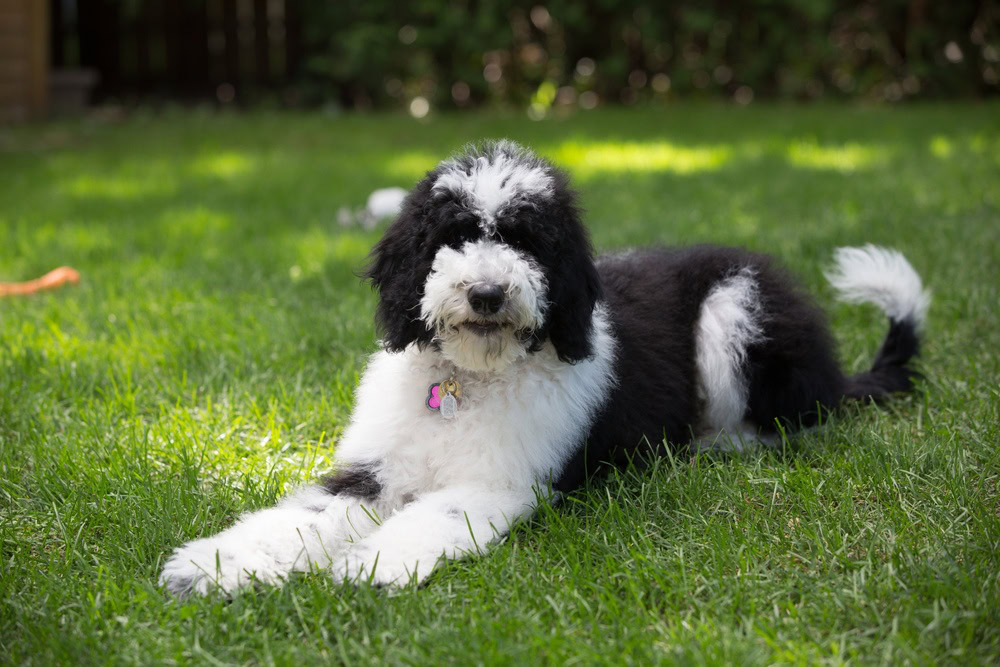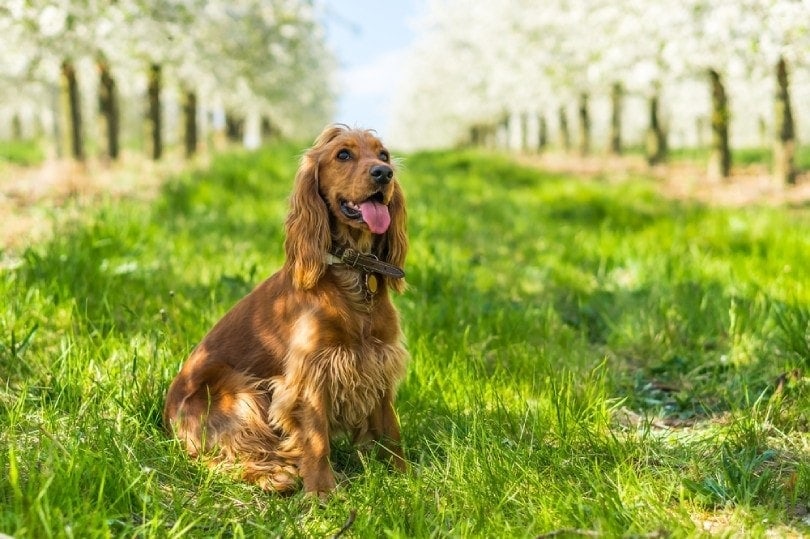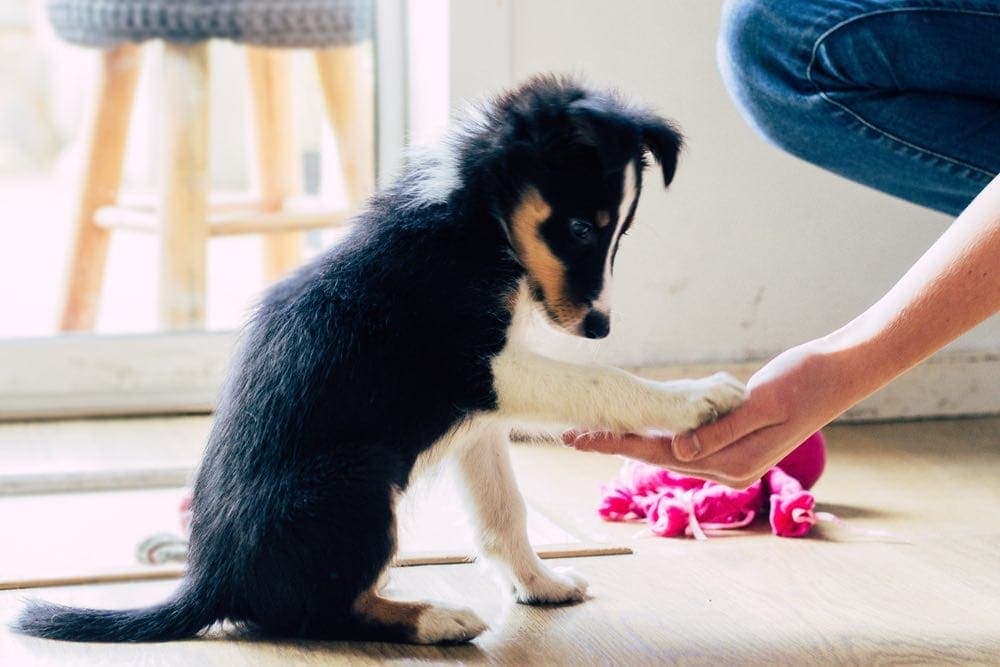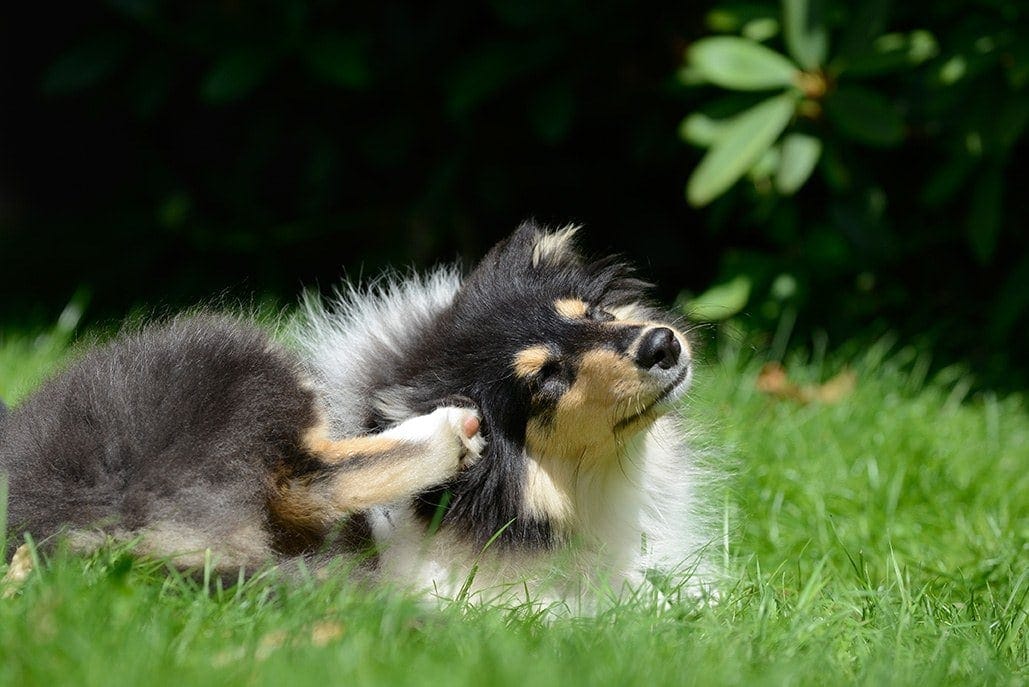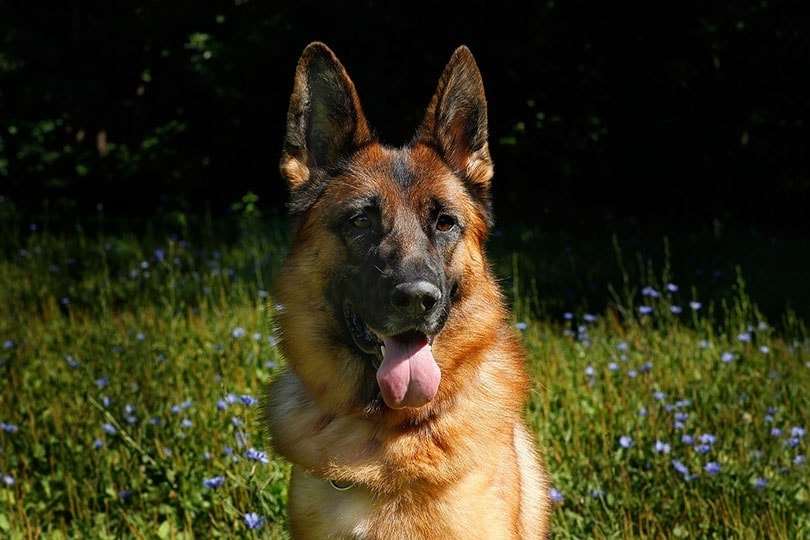Height:
13-28 inches
Weight:
40-85 pounds
Lifespan:
Approximately 12 years
Colors:
White, black, some red
Suitable for:
Families, those looking for a low-shedding dog, those who are active with lots of space
Temperament:
Playful, Gentle, Easy Going, Loyal
A Sheepadoodle is a mix between a Poodle and an Old English Sheep Dog. The Sheepadoodle is a larger breed dog that will bring lots of energy and love into your household. Since the Sheepdadoodle is so large and has quite a few requirements when it comes to grooming, it is best to understand this animal prior to buying one.
In this guide, we will give you the good, the bad, and the ugly about Sheepadoodle parenting. We hope that you will be able to make an educated decision by the time you are done reading.
Sheepadoodle Puppies – Before You Buy…
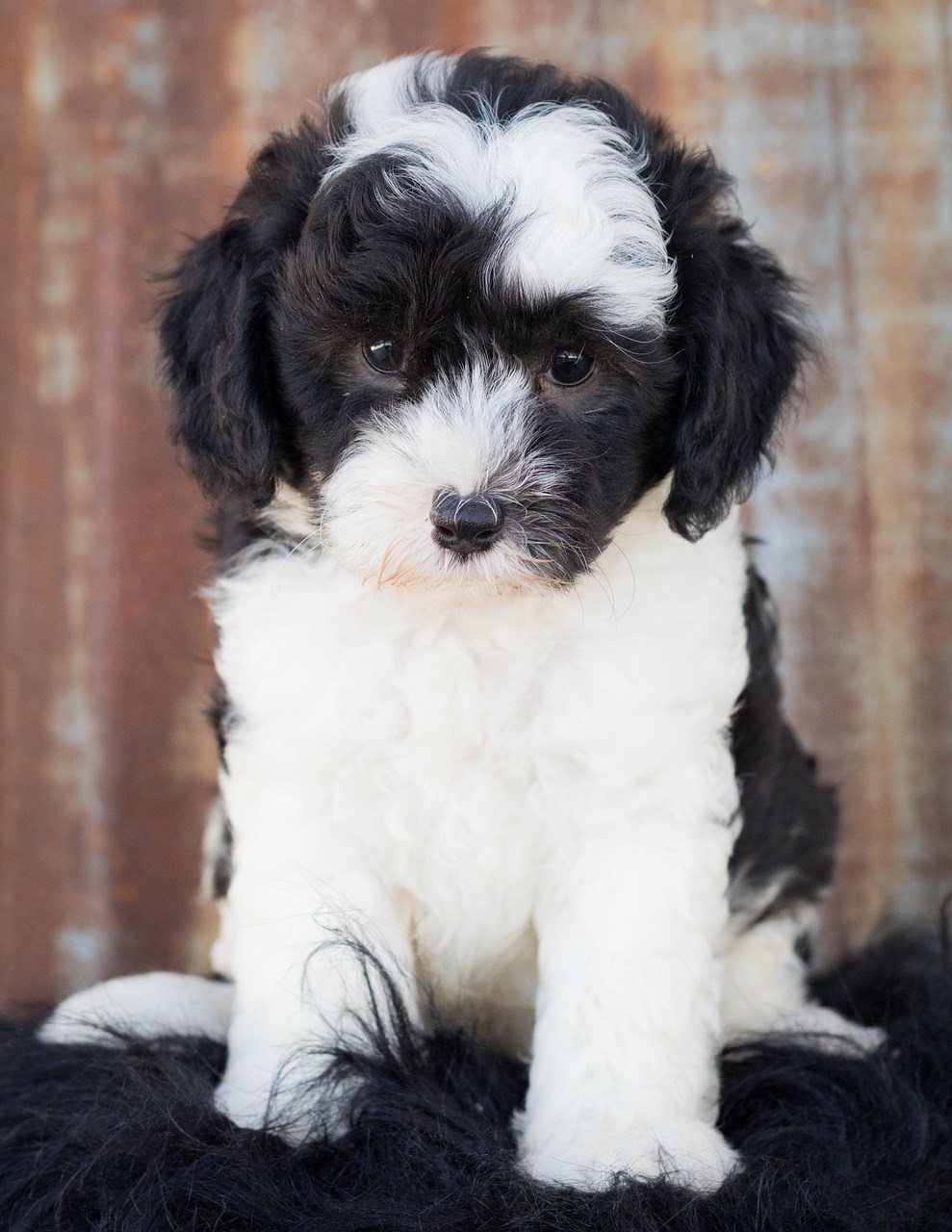
What’s the Price of Sheepadoodle Puppies?
Sheepadoodle puppies are not cheap. The Sheepadoodle will likely cost you over $2000, and sometimes you will pay closer to $4000. There are several reasons why a Sheepadoodle is so expensive. One reason is that this is still a newer and rare breed. Another reason is that these dogs are, for the most part, non-shedding hypoallergenic canines. This is a trait that more and more dog owners are looking for. A combination of low supply and highly sought after qualities are causing high prices in this breed and others like it.
3 Little-Known Facts About the Sheepadoodle
1. They are Hypoallergenic
The Sheepadoodle is an excellent dog for a person who is allergic to most dogs. The Sheepadoodle barely sheds. Given how difficult their hair can be to maintain, this is a positive aspect that comes with being a Sheepadoodle owner.
Common allergens can get caught in the coat of your Sheepadoodle. If you find yourself suddenly sneezing when your dog comes close, they may have some pollen, or another allergen stuck on their fur. Give your dog a quick bath, and they should be back to being allergy-free.
2. They Originated from the US Army
The Sheepadoodle was first introduced in the 1960s when the US Army developed them for use as military dogs.
3. They Are Friendly Watchdogs
The Sheepadoodle has a loud bark that will work well to keep your house protected. If your Sheepadoodle sees a new face at the door, they will alert you to this fact. The only problem is the protection that this dog offers will likely stop at the bark. Sheepadoodles are very friendly and lovable.
If that person were to make it into your house, your Sheepadoodle would very likely bring them a ball to play with. If you are looking for a dog that has the bark but no bite, the Sheepadoodle is an excellent choice. Sometimes the Sheepadoodle will also growl after barking, but again, it is to alert you that there is something new or potentially dangerous nearby.

Temperament & Intelligence of the Sheepadoodle
A Sheepadoodle is easy to get along with. This dog will quickly become a part of your family and will want to be involved in all that goes on in a day. Since the Sheepadoodle is large and can sometimes be a bit hard to train, some people consider these dogs to be wild and unruly. But they are mostly lovable balls of fluff.
If a Sheepdoodle does not get the activity that they need on a given day, they can be very wild; however, they are just trying to play. The Sheepadoodle is an easy-going dog that wants to snuggle and be your friend, and they are always up for a game of ball.
Both the Poodle and the Old English Sheepdog are very intelligent breeds, and therefore so is the Sheepadoodle. This is one of the smarter dog breeds out there, and you will quickly see what they are capable of doing. Their intelligence can be used in a good way or a bad way if they are not appropriately trained.
If you are looking for a companion that will help get you up off the couch, the Sheepadoodle is an excellent choice.
Are These Dogs Good for Families?
The quick answer to this question is yes. Sheepadoodles are a good dog for families because they have many of the characteristics that you would want in a family pet. You will want a playful and kind dog who also watches out for you and your kin. This is precisely what the Sheepadoodle will do. However, there are a few things that must be considered before bringing a Sheepadoodle into your family.
- Busy Lifestyle: If you have a young family with several children and everybody is running in all different directions, the Sheepadoodle could be a tricky fit. The Sheepadoodle requires a lot of attention. Between their exercising and their grooming, this dog will need several hours of your time each day. If you do not have that amount of time to give to a dog, look for a lower maintenance breed.
- Nipping: Since the Sheepadoodle is partly an Old English Sheepdog, they have inherited some of the herding traits and characteristics of their parent breed. One of the herding techniques used by these dogs is to nip. Now, these nips are not at all bites, and they are not aggressive. However, they hurt. Young children may get upset, hurt, or scared by the nipping. The best thing to do is to train the Sheepadoodle early on not to nip. This may take some time and patience, but it will be worth it in the long run.
- Energy: Since the Sheepadoodle is such a high energy dog, your young children may need to be aware and take caution. You will see when a Sheepadoodle is let out to run that they need to burn off a lot of steam. As a young puppy, they may not realize that bumping into or jumping on children can hurt them. Again, with the proper training, this can be addressed. The bottom line is that you should always supervise your children’s interaction with any pets that you may have in the home.
The Sheepadoodle should make a great pet for your family. You will need to make sure that the training is adequate and you may be better off if you have older children who can spend more time caring for the dog. Having a Sheepadoodle while your kids are older can help teach them a great deal of responsibility as well.
Does This Breed Get Along with Other Pets?
The Sheepadoodle can get along well with other breeds if they are trained from an early age. Since this is a high energy dog, it may seem as though they are aggressive, but honestly, they are just looking to play. For a dog that may be scared or nervous, they may think that the Sheepadoodle is bold, and they may try to defend themselves.
Always keep your dog on a leash as they learn to socialize. Introduce your puppy to other animals as soon as it is safe to do so.
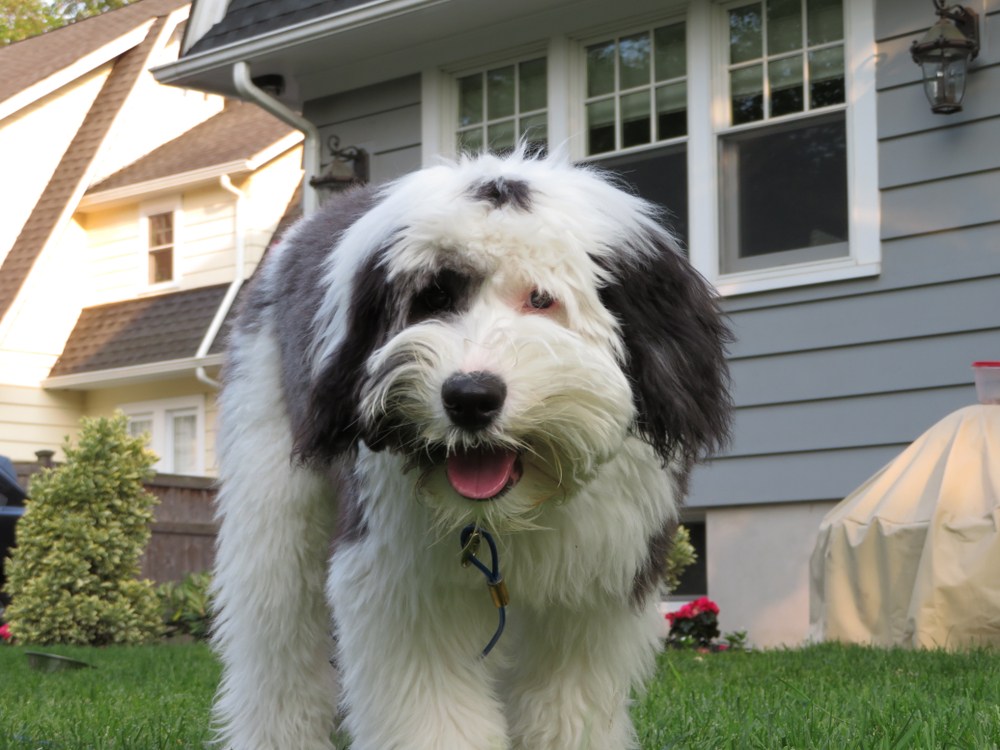
Things to Know When Owning a Sheepadoodle:
Now that you have a general idea of this breed, you may be considering getting one. Before you invest in any animal, it is essential to understand the full scope of what is involved in caring for them. The Sheepadoodle is going to require a lot of your time. In return, you will get a lot of love. However, it is crucial not to underestimate this time requirement. The last thing you want is to get a Sheepadoodle puppy and be in over your head as far as care is concerned.
Food & Diet Requirements
A Sheepadoodle is a large breed dog. They’re going to require quite a bit of food to stay healthy and active. You should always consult with your vet when designing your dog’s diet. When your Sheepadoodle is a puppy, their food requirements will differ from when they become adults. Sheepadoodles like their food and they tend to eat fast at times. You will have to watch out for issues with bloat.
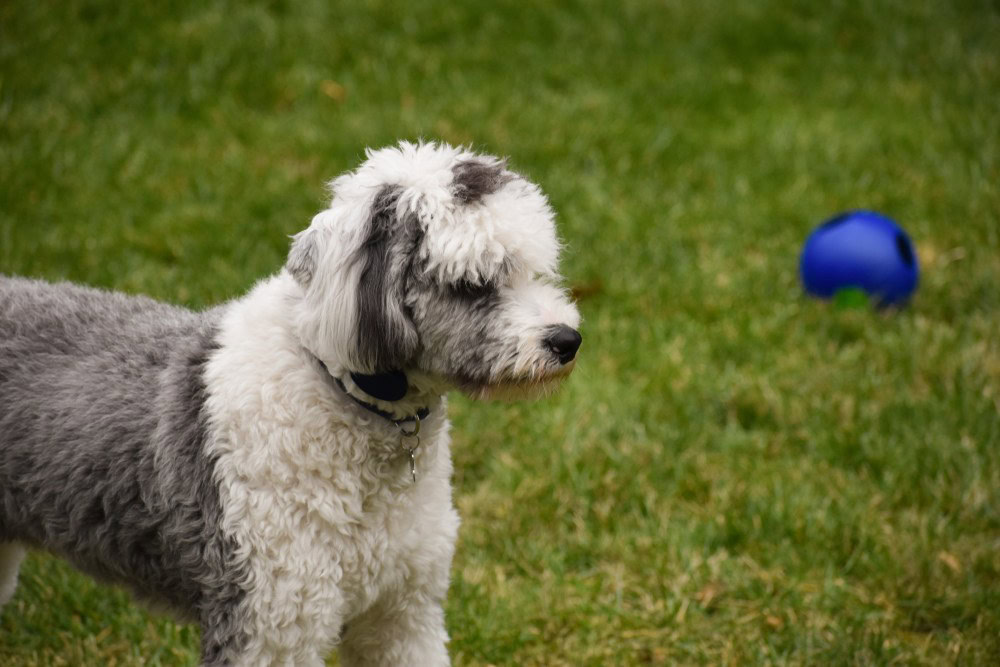
Exercise
The Sheepadoodle needs a lot of exercises. If you are looking for a new workout partner, this dog could be the magic ticket. The Sheepadoodle is going to need about two hours of exercise a day. The exercise can be a mix of outdoor roaming in the yard, going for a walk, or running and playing ball.
You will see problems with Sheepadoodle behavior if you do not expose them to enough exercise. They will be very hyper; they may jump on people or act out. They may never settle down and relax at night if they do not get the proper amount of play in a day.
Try to make sure that you are not just letting the dog out in the yard, but that they are getting in exercise as well. Although it is good for them to walk around and explore, it is imperative that they get some running and playing in. You will need to make exercise a large part of your routine when you own a Sheepadoodle.
If you live in a small space with no proper or local parks for the dog to run, the Sheepadoodle is not for you. A Sheepadoodle needs room to move and explore. If you are a working person that is not home very much during the day, you may have a hard time giving the Sheepadoodle the time and attention it deserves.
Training
When you have a brilliant dog, training can either be very easy or very difficult. With the Sheepadoodle, the training falls somewhere in the middle. Although your dog will pick up on tricks and proper behaviors rather quickly, they may choose to do something else that appeals to them more.
The best way to work with a Sheepadoodle is through positive reinforcement. They are loyal, and they love to be your companion. If they know you are happy, and you continue to provide positive reinforcement, they will repeat the right behaviors.
It is imperative to start training your Sheepadoodle when they are a young puppy. Since this dog has so much energy, they will sometimes have a hard time containing themselves and acting correctly in certain situations. You need to spend time with and work on behaviors starting at a very young age.
Pay close attention to the nipping habit that some Sheepadoodles will pick up. Try to stop this habit quickly. Although the behavior is not done in a mean way, it can still be painful if you are the receiver of one of these nips.
Grooming ✂️
This is the deal-breaker for most people when it comes to owning a Sheepadoodle. With all the love and affection and companionship that you will get from this dog, the grooming is worth it. However, you must make sure you are up for this.
Your Sheepadoodle will need to be professionally groomed every 4-6 weeks. If you keep their hair shorter, you may be able to go longer between appointments at the groomer. Even with this grooming, you will need to brush your Sheepadoodle every day.
This cannot be a two-minute brush and done. With the way their coat is and the fact that they do not shed, you will likely need to spend at least 30 minutes a day brushing your dog.
Another thing you will want to be careful of is your Sheepadoodles ears. They should be cleaned, and hair will sometimes need to be trimmed as well. Poodles are prone to having ear infections, and unfortunately, this has been known to be a problem for the Sheepadoodle as well. If you pay close attention when grooming, you should be able to avoid any significant issues.
- You’ll want to invest in a great brush for this breed: Best Brushes for Poodles
Health and Conditions
Sheepadoodle tends to be a healthy animal. Since this is a newer breed, there is not too much data on the long term health and issues to watch out for. The most common problems seem to be bloat.
- Ear infections
- Bloat
- Allergies
- Stomach issues
- Seizures
- Joint problems
Male vs. Female
The male Sheepadoodles tend to be slightly larger and a little more family-oriented than the female Sheepadoodle. Although the female Sheepadoodle’s primary objective is to take care of and bond with her family, she may do it more independently. The males seem to be more interested in cuddling and being close.
Final Thoughts
The Sheepadoodle is a great dog to have if you’ve got the time to dedicate to them. Do not underestimate the amount of time you will have to spend when it comes to exercising and grooming the Sheepadoodle.
For all the time you’re going to put in to help your dog thrive and stay healthy, they will repay you with love and affection. The Sheepadoodle considers themselves a large part of your family, and they will take great care in protecting and loving the members of your household. This is an excellent breed of dog that will keep you and your family smiling for years to come, just be honest with yourself about the time you have to put into caring for the Sheepadoodle.
Featured Image Credit: Lisa Mounteer, Shutterstock

